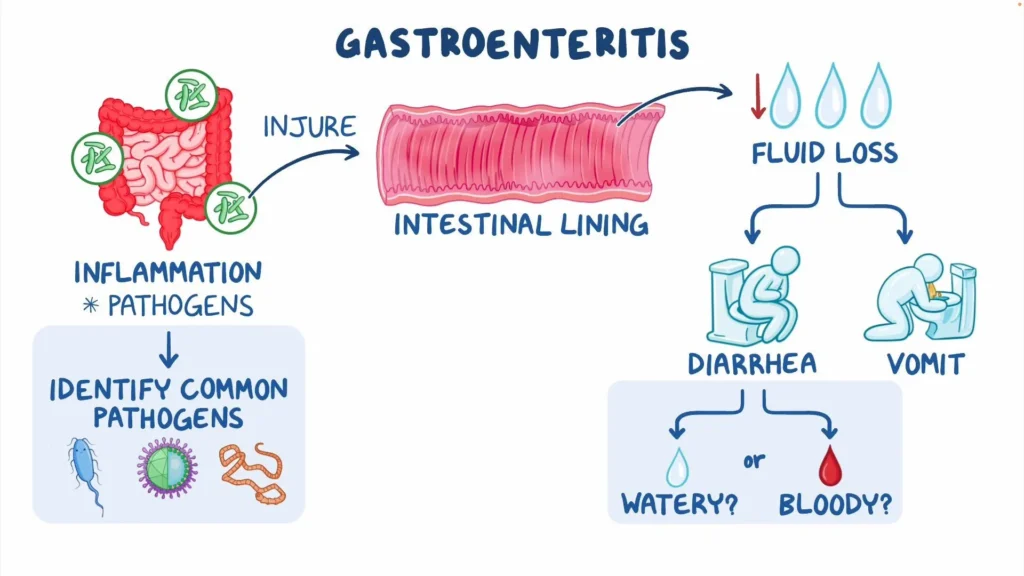Acute gastroenteritis (AGE) is a common condition in children, often characterized by vomiting, diarrhea, and abdominal pain. This article delves into the specifics of acute gastroenteritis-related vomiting in pediatrics, providing a detailed overview of its causes, symptoms, treatment options, and preventive measures.
Understanding Acute Gastroenteritis in Children
Acute gastroenteritis is an inflammation of the stomach and intestines, typically caused by viral, bacterial, or parasitic infections. In pediatric cases, vomiting is a predominant symptom, often leading to dehydration and other complications if not managed promptly.

Common Causes of Acute Gastroenteritis
The most frequent causes of acute gastroenteritis in children include:
- Viral Infections: Rotavirus and norovirus are the leading viral pathogens responsible for pediatric gastroenteritis.
- Bacterial Infections: Bacteria such as Escherichia coli, Salmonella, and Campylobacter can also cause gastroenteritis.
- Parasitic Infections: Parasites like Giardia lamblia are less common but can still lead to severe symptoms.
Symptoms of Acute Gastroenteritis-Related Vomiting
The primary symptoms associated with acute gastroenteritis in children include:
- Vomiting: Often the first sign, vomiting can be frequent and severe.
- Diarrhea: Watery stools are common, sometimes accompanied by mucus or blood.
- Abdominal Pain: Cramping and discomfort in the abdominal region.
- Fever: Mild to high fever may be present.
- Dehydration: Signs include dry mouth, decreased urine output, and lethargy.
Diagnosing Acute Gastroenteritis in Pediatrics
Accurate diagnosis is crucial for effective treatment. Healthcare providers typically rely on:
- Clinical History: Detailed information about the onset and progression of symptoms.
- Physical Examination: Assessing signs of dehydration and abdominal tenderness.
- Laboratory Tests: Stool samples may be analyzed to identify the causative pathogen.
Treatment Options for Acute Gastroenteritis-Related Vomiting
The primary goal of treatment is to manage symptoms and prevent dehydration. Key treatment strategies include:
Oral Rehydration Therapy (ORT)
ORT is the cornerstone of treatment for acute gastroenteritis. It involves the administration of oral rehydration solutions (ORS) to replace lost fluids and electrolytes.
Dietary Management
- Breastfeeding: Continue breastfeeding for infants.
- BRAT Diet: Bananas, rice, applesauce, and toast can be introduced as the child’s condition improves.
- Avoid Certain Foods: Dairy products and sugary foods should be avoided until recovery.
Medications
- Antiemetics: Medications like ondansetron may be prescribed to control vomiting.
- Antibiotics: Only recommended for bacterial infections, as they are ineffective against viruses.
Hospitalization
In severe cases, hospitalization may be required for intravenous fluid therapy and close monitoring.
Preventing Acute Gastroenteritis in Children
Preventive measures are essential to reduce the incidence of acute gastroenteritis:
- Vaccination: Rotavirus vaccines are highly effective in preventing rotavirus-induced gastroenteritis.
- Hand Hygiene: Regular handwashing with soap and water.
- Safe Food Practices: Ensuring food is properly cooked and stored.
- Clean Water: Providing access to clean and safe drinking water.
Acute gastroenteritis-related vomiting in pediatrics is a significant health concern that requires prompt and effective management. By understanding the causes, symptoms, and treatment options, parents and healthcare providers can work together to ensure the best outcomes for affected children. Preventive measures, particularly vaccination and hygiene practices, play a crucial role in reducing the burden of this condition.